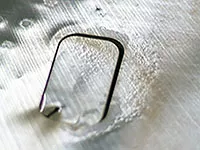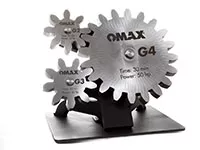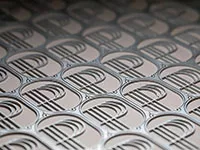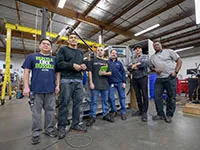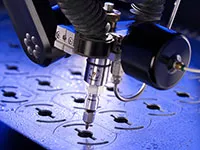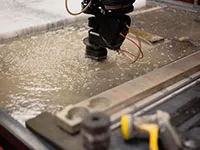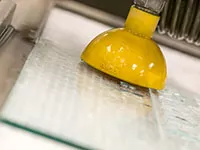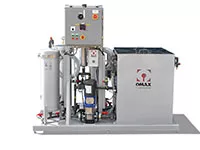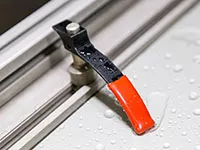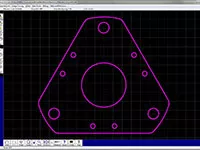Tips & Tricks
Precision Practices: Lead-ins and Lead-outs
With lead-ins, the mixture of water and abrasive starts off cutting into the material at an optimal distance and angle away from the desired cut path. Cutting with a lead-in will let the waterjet stream pierce completely through the material prior to actually cutting the desired part path. A lead-in has three purposes: Read
What Is A Cutting Model?
The abrasive waterjet cutting model is, perhaps, the most significant factor in propelling abrasive waterjets into mainstream manufacturing. Advancements in the OMAX cutting model have decreased part production times, increased cutting precision, and made OMAX abrasive waterjets very easy to program. Yet, there’s not much discussion about what a cutting model is, or what it does. Read
Nesting: What It Is and Why You Should Do It
Learn different types of nesting and see how to use it boost productivity and reduces waste in your waterjet cutting work. Read
OMAX 25th Year Anniversary
25 years ago, the founders of OMAX believed that a company could thrive in manufacturing with a focus on abrasive waterjets. Their mission, to provide precise, easy-to-use, cost effective, standardized, reliable, high quality abrasive waterjets with superior after-sales service, has endured to mold OMAX as the leading company in the waterjet industry. We celebrate our milestone, not by listing our accomplishments but, by celebrating our customers and the employees that made it possible. Read
Taper Compensation
Depending on the cutting conditions, geometry of the cut, the material and other parameters, the cutting edge can take on different shapes that are commonly referred to as taper. A V-shaped cutting kerf will produce a part with a top width smaller than the bottom width. The reverse can also be true, where the bottom width is smaller than the top width. Read
5 Tank Tips for Better Abrasive Waterjet Cutting
Successful shops understand that a clean and well-maintained workspace is key to maximizing productivity. The workspace extends to the machinery. With abrasive waterjet machines, it extends to the tank. We’ve gathered five best practice tips to keep your abrasive waterjet tank in top condition and your production running at peak efficiency. Read
12 Tips for Cutting Glass with Abrasive Waterjet from OMAX
It’s important to support the glass work piece from the bottom with something that provides even support, yet is soft enough so the jet doesn’t ricochet back into the glass and frost the bottom surface. Waterjet brick is a great option for this. Read
Do I Need To Treat The Water For My Waterjet?
For the great majority of waterjet owners in the U.S. and Canada, the answer is “no”. More than 90% of the water than comes from a city’s water supply in these countries can be used in an abrasive waterjet without any treatment. For those areas that fall into the exception, waterjet owners can save significant time and money by conditioning the water, no matter what brand of waterjet machine they’re running. Read
Fixturing for Abrasive Waterjet Cutting
Fixturing refers to holding work material in place while the waterjet cuts parts from it. For most jobs, it's critical that the material doesn't move during cutting, as any movement will affect the precision of the part and can mar the surface. Compared to other cutting methods, the sideways forces of abrasive waterjet cutting are low and the downward force is concentrated to a small area. Read
How to Make Good Part Drawings for Abrasive Waterjets
One of the great things about computer-controlled waterjet systems is that you can draw a part on your computer, or even import a scan or photo, and quickly turn that image into reality. This also introduces opportunities for mistakes. A nice two foot part you drew could be cut as a mini two inch part because you have the units of measure incorrect. The better your drawing, the better your part will be. Follow these tips to create great drawings and to minimize the chances for mistakes. Read

